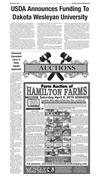032619_YKMV_A8.pdf



March 26, 2019 • Page 8
shop online at www.missourivalleyshopper.com
USDA Announces Funding To
Dakota Wesleyan University
HURON, S.D., March 18, 2019 - U.S. Department of
Agriculture South Dakota State Director Julie Gross
announced a Community Facilities Direct loan in the
amount of $14,527,000 to Dakota Wesleyan University to
build and improve community infrastructure and continue an essential service for 15,250 residents.
“Having access to modern community facilities and
infrastructure is important to any community,” said
Gross. “USDA is proud to partner with Dakota Wesleyan
University with the construction of an essential community facility that advances technological innovation.
The building will house the university’s business and
community functions.”
Dakota Wesleyan University is located in Mitchell,
S.D., in Davison County. The funding will be used to construct a facility to house the university’s business and
community offices. Currently, the business department
uses basement space in another building. The new building will be called the Center for Business and Innovation.
Nationwide, the U.S. Department of Agriculture
(USDA) is investing $91 million to build or improve com-
Enhanced
Concealed
Carry In
State
Capitol
Approved
A bill to allow individuals with an enhanced
concealed carry permits
to bring firearms into
the South Dakota State
Capitol building was
signed March 18 by Gov.
Kristi Noem.
Enhanced concealed
carry permits require
individuals to apply,
pay a fee, and complete
a qualifying handgun
course taught by a
South Dakota certified
instructor. People with
an enhanced permit
must notify the superintendent of the Highway
Patrol at least 24 hours
in advance and provide
dates they will carry in
the Capitol.
South Dakota is one
of 18 states that allow
concealed carry in their
respective state Capitol.
The law will go into effect July 1.
Gov. Noem also
signed:
•HB1050 – An act to
revise certain provisions
regarding the use and
possession of scanning
devices and reencoders
•HB1053 – An act to
revise the value of gifts
permitted for certain
insurance advertising or
promotional programs
•HB1103 – An act to
establish a lemon law for
certain farm machinery
•HB1202 – An act to
revise the number of
qualified directors of a
corporation needed to
take certain actions
•HB1272 – An act to
provide for remote notarization
•SB55 – An act to require the national motto
of the United States to
be displayed in public
schools
•SB68 – An act to
define certain acts as
misbranding of food
products
•SB96 – An act to
expand application of
the tax credit for contributions to a scholarship
granting organization
•SB115 – An act to authorize the conditional
carrying of a concealed
pistol in the state capitol
by certain persons
•SB155 – An act to
authorize additional
nursing facility beds for
the Michael J. Fitzmaurice Veterans Home
munity facilities (PDF, 108 KB) and essential services for
nearly 300,000 rural residents in 12 states.
USDA is funding 16 projects through the Community
Facilities Direct Loan Program. The funding helps rural
small towns, cities and communities make infrastructure improvements and provide essential facilities such
as public schools, libraries, courthouses, public safety
facilities, hospitals, colleges and day care centers.
The projects announced today are located in Alabama, Indiana, Iowa, Kansas, Nebraska, North Carolina,
Ohio, South Carolina, South Dakota, Tennessee, Texas
and Wisconsin.
More than 100 types of projects are eligible for Community Facilities funding. Eligible applicants include municipalities, public bodies, nonprofit organizations and
federally recognized Native American tribes. Applicants
and projects must be in rural areas with a population of
20,000 or less.
In April 2017, President Donald J. Trump established
the Interagency Task Force on Agriculture and Rural
Prosperity to identify legislative, regulatory and policy
changes that could promote agriculture and prosperity
in rural communities. In January 2018, Secretary Perdue
presented the Task Force’s findings to President Trump.
These findings included 31 recommendations to align the
federal government with state, local and tribal governments to take advantage of opportunities that exist in
rural America. Increasing investments in rural infrastructure is a key recommendation of the task force.
To view the report in its entirety, please view the Report to the President of the United States from the Task
Force on Agriculture and Rural Prosperity (PDF, 5.4 MB).
In addition, to view the categories of the recommendations, please view the Rural Prosperity infographic (PDF,
190 KB).
USDA Rural Development provides loans and grants
to help expand economic opportunities and create jobs
in rural areas. This assistance supports infrastructure
improvements; business development; housing; community facilities such as schools, public safety and health
care; and high-speed internet access in rural areas. For
more information, visit www.rd.usda.gov.
AUCTIONS
















 Previous Page
Previous Page





